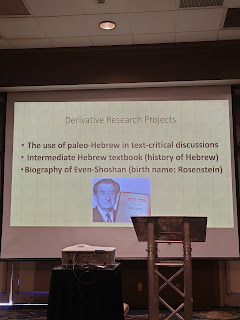On Sunday, Feb 27, 2022, I went to my first subject conference in Brea, North Orange County! One of the subjects I am responsible for in my new job as Undergraduate Learning Librarian is Religious Studies, which includes the Jesuit School of Theology as well as the Graduate Program in Pastoral Ministry. The conference program featured mostly panels of biblical scholars dealing with specific books, translation, theory, etc., but there was one panel on pedagogy in the field which was my main focus.
3a) Teaching Biblical Studies
Presiding: Carl Toney, Hope International University
“Words in Context: A New Hebrew Dictionary for the Developing Student”
Robert Duke, Azusa Pacific University
Covid gave this guy more time to finish humanities projects like his Hebrew Dictionary. Sounds like he wants to publish it in print initially, but this dictionary really sounds like it needs to be digital and available to search in a responsive interface.
I got some really good recommendations for Hebrew dictionaries from this presentation, so I plan to check them against the Library's current holdings.
“Mentoring Students through Assessment for Transformation: Using Pre-post Assessments and Effect Size to
Determine Learning and Intervention”
Gabriel Estrada, California Baptist University
This inspirational talk utilized the basics of assessment to boost student engagement and truly measure the learning each student accomplishes during the term. By doing a pre-post test and soliciting goals from students, the faculty member was able to go beyond tracking A-level students continuing to do A-level work and down to what specifically they were learning during the course. Achievements for respective students could be measured, and soliciting goals really motivated the students to feel invested.












